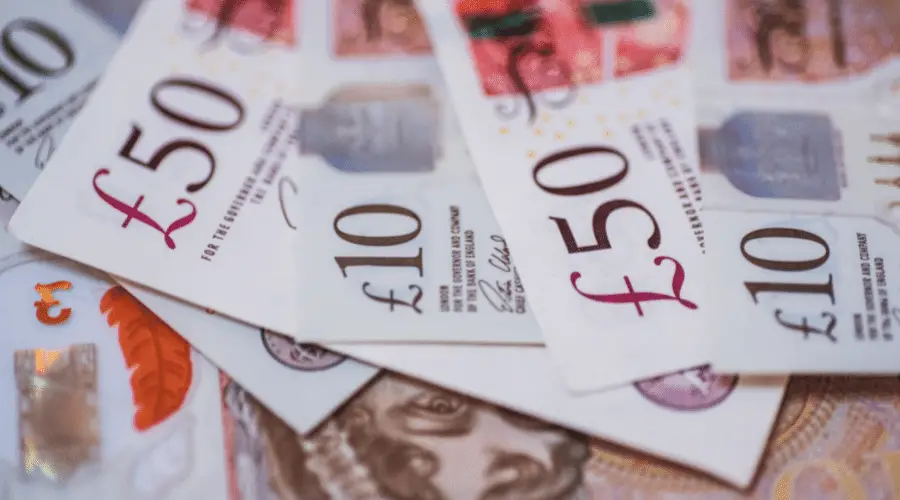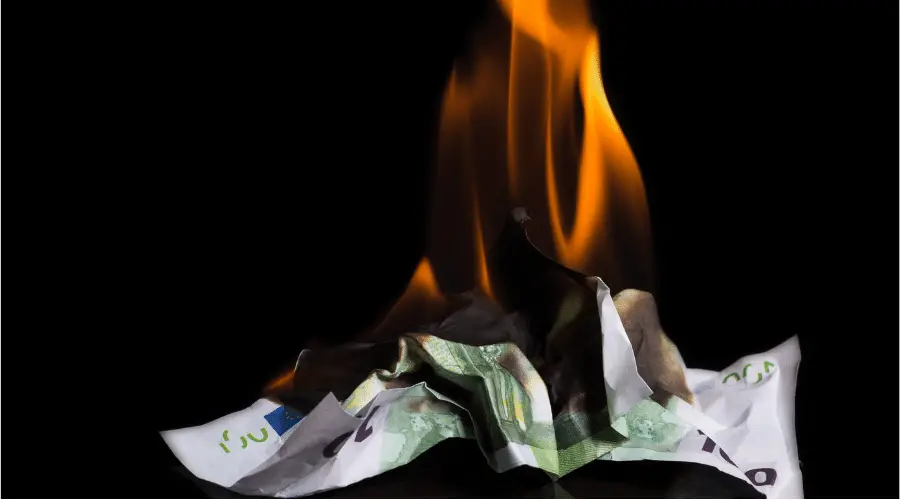Many people find it inconceivable to consider throwing away their hard-earned money. However, some may do it as an artistic expression or as a protest against taxation, signifying the intrinsic worthlessness of paper money. If you’re looking for information about whether it is illegal to destroy in the UK, look no further.
In the United Kingdom, defacing a banknote is illegal, but destroying or burning it is not. However, destroying a banknote is dangerous as burning inks produce chemical fumes that can injure your health if inhaled. Also, participating in the destruction is unethical, so you should avoid it.
Is it illegal to destroy money in the UK?
Simply put, the deliberate destruction of a banknote is legal in the UK. However, the Currency and Banknotes Act of 1928 makes it illegal to print, stamp, or otherwise tamper with a banknote. Those writings or scribblings you occasionally see on currency are, therefore, legally forbidden.
Strangely, it is not unlawful to completely destroy a banknote, but the Coinage Act of 1971 makes it illegal to destroy coins.
Is it illegal to deface money in the UK?
Defacing money in the UK is illegal, so you should not write or put a stamp on a banknote. Although the offence is punishable, it’s not worth the time for the crime-fighting authorities. The treasury finds it hard to track instances where individuals deface banknotes, and the police find it a waste of time.
Defaced banknotes contain words, signs, symbols, and drawings made on them intentionally or otherwise. This means that even though you can end up accidentally defacing money, it is still illegal. For instance, children may draw Peppa Pig on a £10 note. While cute, it’s still illegal.
If you are offered a banknote that contains ink or dye stains, you should refuse it. This is because banks use dye-staining to track stolen banknotes. Dyes prevent robbed cash from becoming a part of the economy and act as a deterrent to stop criminals from profiting from robbing banks.
That being said, any soiled, dirty, limp, or worn-out banknote is not considered defaced and can be used in everyday routine. Therefore, knowing the different states that a banknote can be found in can be the difference between an unpleasant encounter and a full-blown criminal activity.
In some cases, the defaced banknote can be flagged as forged or counterfeit, and the bearer can be subjected to Section 17 of the Forgery and Counterfeiting Act 1981. A person is guilty of forgery if they try to use a false instrument by convincing another person to accept it as a genuine instrument.
If someone notifies the police, you can face a jail term of up to ten years. Therefore, you should be careful while accepting stained or defaced money from other people or vendors.
Despite this, given the recent trend away from physical cash, this may become a non-issue in the near future. For more information on this, click on the following link to read my post on Can UK Businesses Refuse to Accept Cash?

Is defacing coins in the UK illegal?
Just like banknotes, it’s illegal to deface or melt coins and use them for other purposes. The Coinage Act 1971 prohibits people from melting or breaking down any coin produced after 16th May 1969 unless they obtain explicit approval from the British government.
A coin is considered defaced if it has been impaired or diminished. If you are found defacing or damaging a coin, the Royal Mint or the Treasury can fine you up to £400 or put you in prison for about two years.
Having defaced coins can also be a catalyst for the use of forged or counterfeit coins. Section 18 of the Forgery and Counterfeiting Act 1981 makes selling, distributing, or having forged coins in custody an offence that is punishable by imprisonment for up to ten years. Therefore, you should notify the Treasury if someone hands you a defaced coin that could potentially be confused as counterfeit.
Is it illegal to rip up banknotes in the UK?
Ripping banknotes is not illegal, but it does not mean that you can rip them up deliberately. However, if you accidentally rip your banknotes, you can always take them to the bank and receive replacement banknotes after the bank checks them for the serial numbers on both sides.
In some contexts, ripping a banknote may be regarded as hatred towards The Queen (now The King), leaving it up to the police to give you a warning or prosecute further.
What is the punishment for destroying money in the UK?
Currently, there is no punishment for burning or destroying money in the UK. However, it is unethical and immoral to burn money when it can be used elsewhere or given to charity. Even if it’s not illegal to burn money, it is expected of you as an abiding citizen to not waste it or play an active role in destroying it.
What is the punishment for defacing money in the UK?
The UK government considers defacing money a crime against the queen, regarded as treason, and the culprit is liable for conviction to penalty. However, the enforceability of the punishment depends on its severity and the regulatory departments’ discretion.
For instance, if the police catch you defacing money in public, you can be fined up to £1000 or jailed for up to two years. But if it’s your lucky day, you may just be reprimanded and given a warning.
Is it illegal to write on money in the UK?
In the UK, it’s illegal to write or put a stamp on money. You should not accept banknotes that have something written on them. Additionally, you should also protect them from children who might end up doodling on a banknote. If this happens, and you can be convincing enough to prove it was an accident, you can have it exchanged from the Treasury.

Which laws/ regulations govern destroying or defacing money in the UK?
As stated by the Currency and Banknotes Act 1928, defacing a banknote by printing, stamping, or writing is an offence punishable by law. However, the enforceability of this offence is up to the police and treasury.
The Coinage Act of 1971 makes it illegal for unauthorised individuals to break or melt coins. However, if you are collecting flat pennies as mementoes, you don’t need to be concerned.
Is it treason to rip up British money?
No provision in any treason laws passed over the years says you may be held responsible for destroying money. However, you should refrain from ripping any money because there is no upside to it; you are exacerbating the environment, your buying power, and even your health.
Is it illegal to burn money in the UK?
Money is permanently lost if it is destroyed, torn apart, or burned. However, if a note is defiled, an attempt may be made to maintain it in circulation. The worst consequence of it may be images of Her Majesty (now His Majesty) sporting a comedic moustache or a scrawled face still being used to pay for your monthly groceries. No particular law explicitly states the illegality of burning money in the UK.
Defacing a banknote is prohibited in the UK. However, ironically enough, burning or destroying one is not. There are no positives from this purportedly unethical activity. Hence, you should aim to avoid it altogether, even if there are no laws directly instructing against attempts to burn money.
